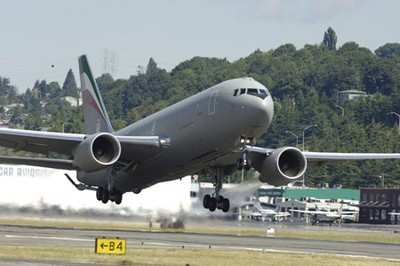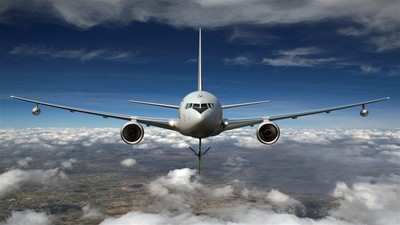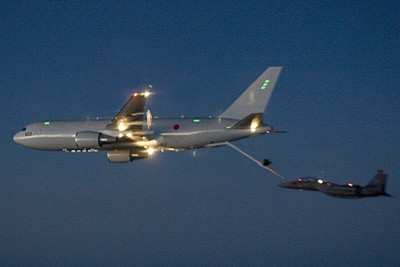The KC-X Battle Drags On...
We couldn't believe it, either. An entire week has
passed since ANN last ran a story related to the recent
awarding of a lucrative US Air Force tanker contract to a team
comprised of EADS and Northrop Grumman, over an offering from
Boeing.

Last time we checked in,
Boeing had lodged a formal protest to the Government Accountability
Office... claiming, essentially, the Air Force altered its own
rules to favor the larger Northrop/EADS KC-45A during the contract
evaluation process, over Boeing's smaller KC-767.
This week, Boeing claimed the US Air Force likely would pay up
to $30 billion more in fuel bills over 40 years to operate its
fleet of 179 Airbus A330-200-based KC-45A aerial refueling tankers,
compared to a similar number of tankers based on the Boeing
767-200ER.
Boeing bases its assessment on a Conklin & de Decker
Aviation Information study, funded by Boeing earlier this year,
that calculated the Air Force's cost with oil at $100 per barrel
and $125 per barrel. Oil prices hit a record high last week above
$110 a barrel, and many analysts expect prices to continue
climbing.

In January, the American planemaker funded and
released a 53-page study by Conklin & de Decker,
that claimed Boeing's 767 airplane consumed 24 percent less fuel
than the larger A330 and would save about $14.6 billion in fuel
costs over 40 years. The study used published data to calculate the
fuel consumption of flying a fleet of 179 767-200ER and Airbus
A330-200 aircraft over a 40-year service life. The Air Force's
Request for Proposal called for a highly capable, medium-sized,
low-risk and low-cost refueling tanker to replace its aging fleet
of KC-135 tankers.
Conklin & de Decker recalculated fuel price costs for the
Boeing 767-200ER and the Airbus A330-200, commercial twin-aisle
aircraft that are being converted to military aerial refueling
tankers. Boeing says both planes fly about the same distance, but
the larger, heavier A330 is less fuel efficient than the 767-200ER.
As a result, the A330-200 consumes 24 percent more fuel per trip
than the 767-200ER.
The study also factored in estimated costs of refining,
transportation, storage, handling and fueling the aircraft. It
concluded the estimated price per gallon at $3.11 with oil costing
$100 per barrel would cost the Air Force about $25 billion dollar
more over the 40-year service life of 179 Airbus A330-200 tankers,
and $29.8 billion more with oil at $125 a barrel.

The Air Force previously estimated that it pays an additional
$600 million a year for each $10 per barrel increase.
On February 29, the Air Force selected Northrop Grumman-EADS to
build 179 next-generation A330 tankers. In briefing Boeing on their
decision, Air Force evaluators acknowledged that they placed little
value on fuel and maintenance lifecycle costs, Boeing claims,
despite paying $6.6 billion on aviation fuel in 2006.
"Based upon what we have seen, we continue to believe we
submitted the most capable, the lowest risk and lowest cost
airplane as measured against the Air Force's Request for Proposal,"
said Mark McGraw, vice president, Boeing Tanker Programs. "This
latest estimate in increased life-cycle costs for the Airbus plane
adds to our fundamental concerns with the Air Force's evaluation
and decision."

As ANN has reported
extensively, EADS/Northrop argue the "flaw" Boeing
cites -- the KC-45A's larger size -- is in fact its greatest
advantage: it can hold more fuel and cargo than the KC-767, and
carry it farther... making the larger, less-fuel efficient plane
more economical in the long run.
 ANN's Daily Aero-Term (05.01.24): Say Altitude
ANN's Daily Aero-Term (05.01.24): Say Altitude ANN's Daily Aero-Linx (05.01.24)
ANN's Daily Aero-Linx (05.01.24) Classic Aero-TV: Korean War Hero Twice Reborn
Classic Aero-TV: Korean War Hero Twice Reborn Airborne 04.29.24: EAA B-25 Rides, Textron 2024, G700 Deliveries
Airborne 04.29.24: EAA B-25 Rides, Textron 2024, G700 Deliveries Airborne Affordable Flyers 05.02.24: Bobby Bailey, SPRG Report Cards, Skydive!
Airborne Affordable Flyers 05.02.24: Bobby Bailey, SPRG Report Cards, Skydive!






